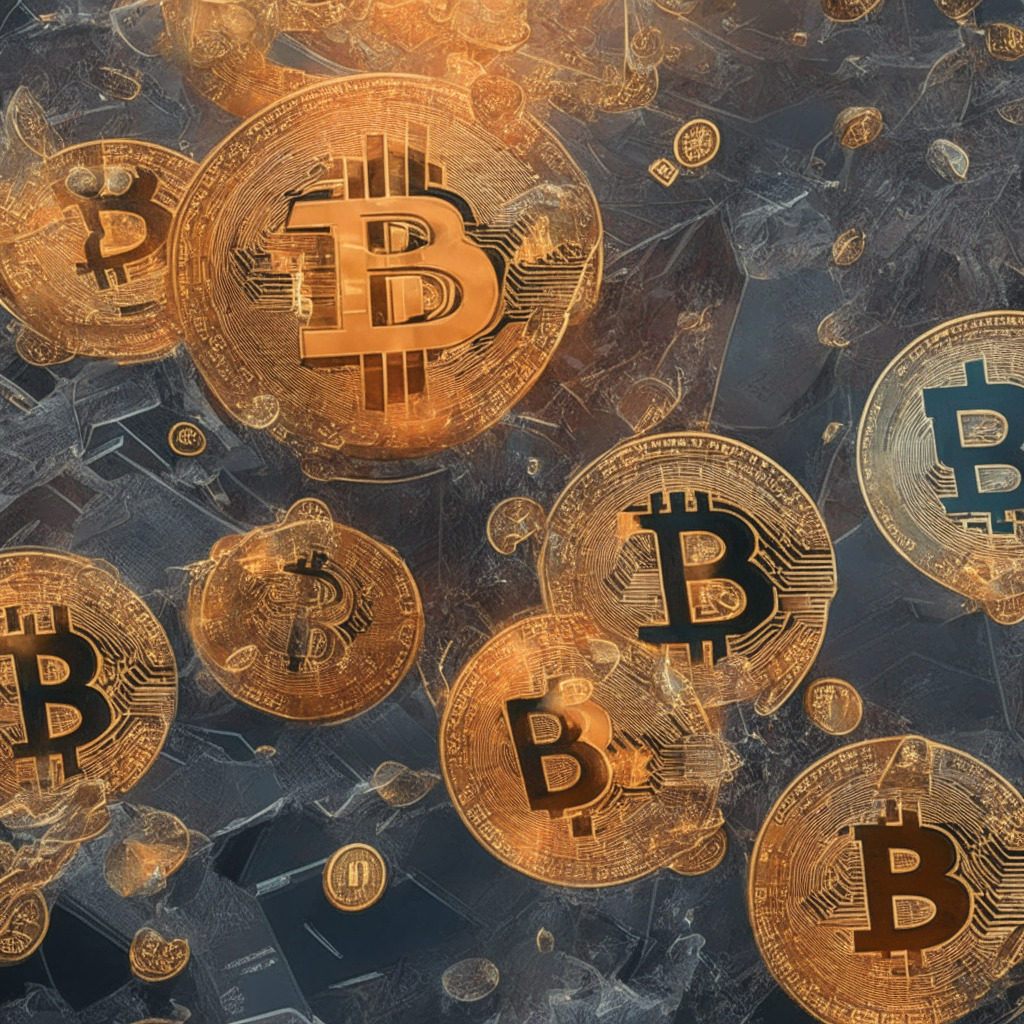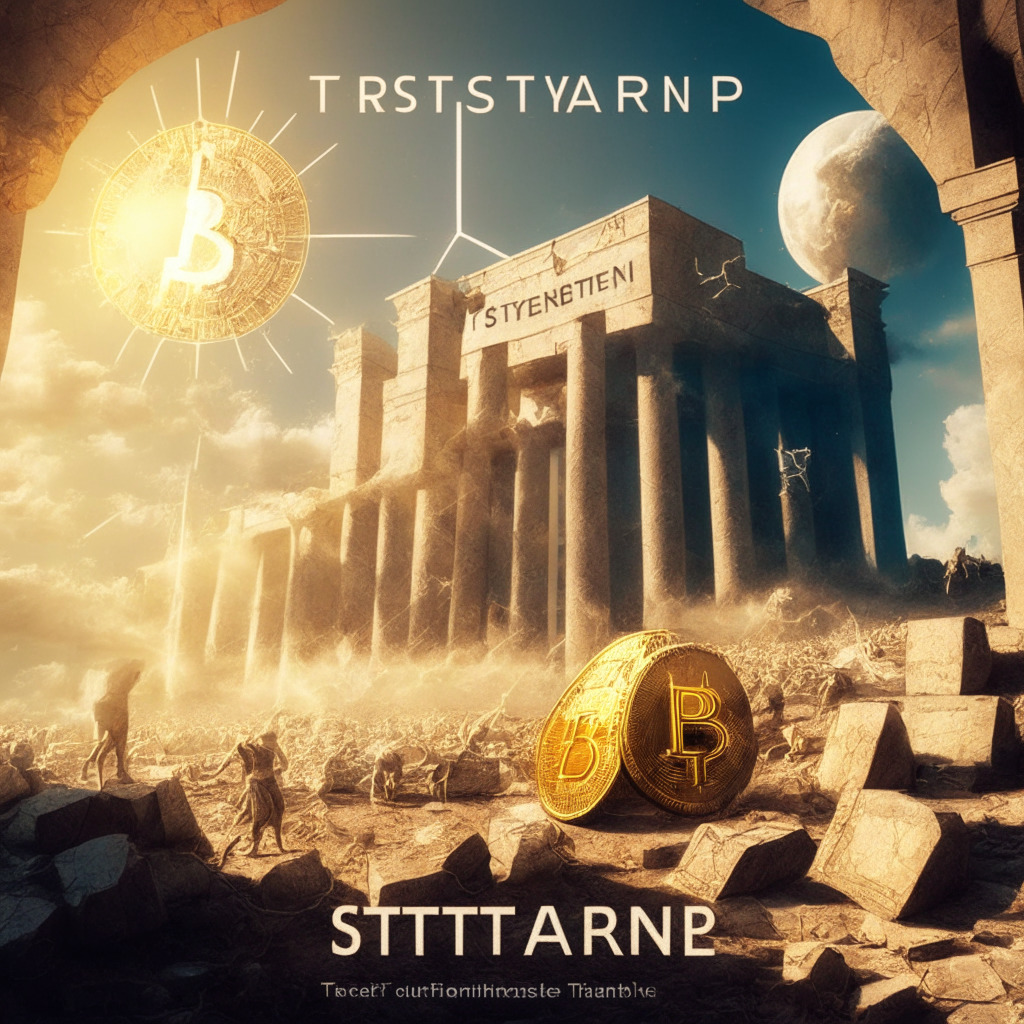The XRP Ledger experienced a significant spike in account deletions, primarily attributed to Poloniex deleting around 15,000 old XRP accounts, recovering 275,000 XRP tokens, and prompting a substantial token burn in fees. The account deletion and token burning could optimize exchange operations and maintain compliance, but may also impact XRPL users and XRP’s market value.
Search Results for: us treasury
Reclaiming Idle Tokens: How DAO Voting Reshapes the Crypto Ecosystem’s Power Dynamic
Sweat Economy DAO hosted a voting process concerning 2 billion locked $SWEAT tokens in inactive wallets, valued at around $10 million. With 83% of over 355,000 voters supporting reclamation, the decentralized autonomous organization (DAO) will transfer these tokens to its governance treasury contract. The community will determine how to utilize the reacquired tokens.
Tether’s Slight Depegging and AAVE’s Curve Freeze: Analyzing the Impact on Stablecoin Markets
Tether (USDT) experienced a slight depegging from its 1:1 ratio with the US dollar, coinciding with AAVE’s decision to freeze Curve (CRV) use as collateral for loans. This prompted whales and investors to capitalize on arbitrage opportunities, leading to Tether’s depegging at $0.996.
Tether Struggles to Maintain Dollar Peg: Impact on Stablecoin Confidence and Markets
Tether (USDT) recently fell below its dollar peg, trading at $0.996, raising concerns among stablecoin users. CTO Paolo Ardoino assured the company’s readiness to face challenges. However, skepticism surrounding Tether’s dollar-backing and decreased investor confidence emphasize the importance of maintaining stablecoin pegs to fiat currencies.
Bankrupt Bittrex Allows Asset Withdrawals: Balancing Consumer Interests vs. Crypto Regulation
US Bankruptcy Judge Brendan L. Shannon recently granted Bittrex customers the opportunity to withdraw assets from the bankrupt exchange platform despite the DOJ’s objection. The court order highlights the complex balance between consumer protection and regulation in the cryptocurrency industry.
Atomic Wallet Breach: $100M Loss Linked to North Korea, Security Protocols under Scrutiny
Elliptic discovered that over $100 million was lost by Atomic Wallet users, with more than 5,500 wallets compromised. The Lazarus Group, allegedly linked to North Korea, is believed to be behind the breach. Dr. Sarah Brown emphasizes the need for advanced security protocols and user vigilance in the crypto market.
Balancing Privacy and Efficiency in Retail CBDCs: Pros, Cons, and Conflicts
U.S. Treasury official Graham Steele highlighted the importance of privacy and anonymity in developing a potential retail Central Bank Digital Currency (CBDC) and suggested that Privacy Enhancing Technologies be considered for preserving user anonymity. Steele also discussed pros, cons, and challenges, including minimizing illegal transactions and ensuring privacy.
Crypto Superapp Finblox Enters Tokenized T-Bill Market: Opportunities and Challenges Explored
Crypto investment platform Finblox enters the tokenized U.S. Treasury bills market, aiming to position itself as a “crypto superapp” offering various financial services. The flourishing $500 million asset class allows investors to allocate stablecoins in short-term government bonds for safer returns.
Atomic Wallet Hack: $35M Laundered, Regulatory Woes, and Emerging Cyber Threats
The crypto world experienced a major security breach as attackers exploited Atomic Wallet and stole $35 million in tokens. As funds move via the OFAC-sanctioned exchange Garantex, the involvement of North Korean hacking group Lazarus is suspected. This incident highlights the challenges cryptocurrencies face for security and regulatory compliance.
FCA’s Crackdown on Crypto Inflation Hedge Claims: Debate and Implications on UK’s Market
The UK’s Financial Conduct Authority (FCA) proposes new rules targeting claims that cryptocurrencies can act as inflation hedges. The FCA urges caution, citing limited data on crypto performance during high inflation and inherent volatility. The rules aim to encourage responsible promotion and are set to take effect on October 8.
Polygon 2.0: Unleashing Unlimited Scalability and Bridging Crypto’s Gaps in a Troubled Market
Polygon 2.0, an Ethereum-based Layer-2 scalability solution, aspires to democratize the global economy by creating a user-centric, equitable internet experience. However, uncertainty looms due to the SEC ruling on its native cryptocurrency, MATIC. The new iteration focuses on unification, infinite scalability, and leveraging Zero-Knowledge technology for seamless interaction.
Bitcoin’s Struggle with $26,000: Regulatory Fears and Market Impact Before CPI Report
Bitcoin briefly surpassed $26,000, impacted by SEC lawsuits against Binance and Coinbase, and concerns about US monetary policy. Market participants await May’s CPI report and the Federal Reserve’s interest rate decision, while mainstream acceptance for crypto faces challenges due to decentralized finance (DeFi) being the primary gateway.
DAOs: Unleashing Decentralized Power or Struggling to Retain Participants?
Decentralized autonomous organizations (DAOs) hold immense potential for community engagement and financial decision-making but face challenges in retaining participants and achieving their mission. With a value of $8.7 billion in June 2022, key elements include shared treasury, smart contracts, and governance tokens, while successful DAOs balance innovative blockchain features with familiar collaborative practices.
Andreessen Horowitz’s Crypto Expansion: London Office and UK’s Rising Role in Blockchain Future
Venture capital firm Andreessen Horowitz (a16z) plans to open its first international office in London, citing the U.K. government’s encouraging policies for decentralized startups. The office, led by Sriram Krishnan, will aim to invest in crypto and startup ecosystems throughout the U.K. and Europe.
Crypto Wash Trading Regulations: Balancing Tax Evasion Prevention and Innovation
Democrats push for tighter regulations on cryptocurrency wash trading to address tax evasion, as the IRS doesn’t currently treat cryptocurrencies as securities. Regulators aim to balance fostering innovation while protecting investors and the broader financial system from fraudulent activities.
Groundbreaking Ruling on DeFi Regulation: A New Era of Compliance or Stifled Innovation?
A federal judge ruled in favor of the U.S. Commodity Futures Trading Commission against Ooki DAO for offering unregistered commodities, breaking the notion that DeFi entities are beyond regulatory scope. This highlights growing regulatory encroachment and questions how future regulations will adapt to decentralized platforms.
Striking Balance: Crypto Regulation vs. Consumer Protection & Innovation in a Maturing Market
The recent objection by the US Department of Justice to Bittrex’s liquidation plan highlights the complexity of cryptocurrency regulations and their impact on the industry. Balancing accountability, fairness, innovation, and consumer protection remains a significant challenge for the fast-evolving crypto sector.
Circle’s New Chief Legal Officer: A Path to Compliance or Regulatory Crackdown?
Stablecoin issuer Circle appoints Heath Tarbert as chief legal officer to tackle ongoing regulatory crackdown on cryptocurrencies. Tarbert’s expertise in highly-regulated industries aims to navigate complex regulatory landscapes, balancing innovation and compliance amidst increased scrutiny in the crypto industry.
Former CFTC Chair Joins Circle: Navigating Crypto Regulations and Shaping Future Guidelines
Circle Internet Financial hires Heath Tarbert, former CFTC chair, as chief legal officer to navigate complex regulatory challenges in the crypto industry. Tarbert’s global experience supports advancing USDC’s utility value, building relationships with governments, and establishing sound regulations for digital assets.
Cryptocurrency Regulation in the UK: Gambling or Financial Services? Exploring Lawmakers’ Divide
U.K. lawmakers are divided on cryptocurrency regulations, with some suggesting treatment like gambling, while others support existing financial services regulations. The All Party Parliamentary Group (APPG) for crypto assets supports the government’s proposal, citing effective tax collection and robust consumer protections associated with financial services regulations. The debate continues as U.K. lawmakers seek a balanced approach for a safe and secure crypto market.
Mantle Network Mainnet Launch: Modular Scaling, Security Concerns, and Staking Future
Mantle Network, an Ethereum layer-2 scaling solution, prepares for its mainnet launch following its merger with BitDAO. The modular Mantle ecosystem differs from current layer-2s by outsourcing its data availability layer, increasing efficiency but posing security and trustlessness concerns. The Mantle token (MNT) will facilitate gas fees, ecosystem grants, staking, and governance voting.
Exploring Aave’s GHO Stablecoin: Unlocking Financial Flexibility and Bolstering Platform Growth
Aave’s ARFC proposal introduces GHO, a native stablecoin launching on Ethereum mainnet, offering users collateralized minting and financial flexibility. The Aave DAO treasury benefits from GHO loan interest, bolstering platform growth and showcasing commitment to user-centric innovations in decentralized finance.
Crypto Tax Compliance Pressure and North Korea’s Alleged Laundering: A Troubling Connection
The crypto industry faces increasing pressure for tax compliance as US Congress members urge Treasury and IRS to implement regulations. Meanwhile, funds from the $35 million Atomic Wallet hack are traced to Sinbad.io, allegedly involved in laundering over $100 million in cryptoassets.
Raft’s stETH-Backed R Stablecoin: Innovation or Risky Experiment?
Raft’s new U.S. dollar stablecoin R, backed by Lido’s staked ether (stETH), introduces a unique offering in the crypto world. With a focus on avoiding inherent risks associated with fiat assets as collateral, Raft’s stablecoin aims to attract large players in the liquid staking ecosystem and withstand ongoing regulatory pressures.
Uniswap’s V3 Fee Switch Debated: Failed Proposal, Legal Concerns, and Timing Issues
A recent DAO community poll on a proposed Uniswap V3 fee switch by GFX Labs ended in a split vote, delaying the initiative despite majority support. The proposal sought to charge liquidity providers a fraction of fees across Uniswap V3 pools and redistribute earnings to the UNI community. The failed vote was attributed to incorrect structuring, but consensus for future fee switches appears to be growing.
Blockchain vs OFAC: Tornado Cash Sanctions Threaten Privacy and Innovation in Crypto World
The Blockchain Association has backed Coin Center’s lawsuit against the Treasury Department and OFAC, arguing that sanctions against Tornado Cash hinder Americans’ ability to transact privately on the Ethereum network. They stress that regulatory actions should target malicious actors, not technology, acknowledging the legitimate uses for privacy-enhancing tools like Tornado Cash. This lawsuit highlights the critical balance between innovation, privacy, and regulation in the evolving blockchain future.
Will Bitcoin’s Bullish Surprise Emerge If $26,000 Holds? Debating BTC’s Future Movements
Bitcoin dipped to $26,519, but traders expect a bullish surprise if it doesn’t breach $26,000. Crypto Ed believes BTC could bounce back to $27,500, while Tedtalksmacro notes favorable macro conditions. Market participants remain cautiously optimistic as both bulls and bears maintain a stalemate.
Litecoin’s 7% Surge: Halving Event and Bitcoin Congestion’s Impact on LTC Market
Litecoin experiences a 7% price increase in 24 hours, driven by its upcoming network halving, increased activity since April, and Bitcoin network congestion. The halving will result in a 50% reduction of block rewards, attracting strategic investors and serving as a temporary alternative during BTC congestion, although uncertainties remain.
Exploring MakerDAO’s $1.28B Bet on Real-World Assets: Boosting Yield or Risky Undertaking?
MakerDAO’s community voted to open the BlockTower Andromeda vault, aiming to invest up to $1.28 billion in short-dated U.S. Treasury bonds using overcollateralized DAI stablecoin. This reflects efforts to diversify reserve assets, generate higher yields, and integrate crypto with traditional financial markets.
Tether’s Record Market Cap: Resilience, Transparency, and Crypto Mining Ventures
Tether’s market cap reaches a new high of $83.2 billion, recovering from a $20 billion loss last year. Its resilience, industry-leading transparency, and recent ventures into crypto mining and sustainable practices contribute to its regained trust and success in the cryptocurrency landscape.
Cryptocurrencies, Fentanyl, and China: Balancing Regulation and Innovation
Senator Elizabeth Warren highlighted a connection between cryptocurrency payments and China-based firms supplying fentanyl precursors, raising concerns on the need for effective cryptocurrency regulations. Critics argue that imposing more regulations might hinder the growth and innovation of blockchain technology. Senator Warren plans to reintroduce legislation addressing the regulatory gaps related to illicit cryptocurrency use while safeguarding potential innovations in finance.
Cryptocurrency, Fentanyl Trade, and Balancing Regulation: An In-Depth Analysis
Senator Elizabeth Warren highlights the connection between cryptocurrency and the Chinese fentanyl trade, proposing the Digital Asset Anti-Money Laundering Act to halt such transactions. Striking a balance between security and innovation is crucial in regulating the blockchain and digital asset sector.































